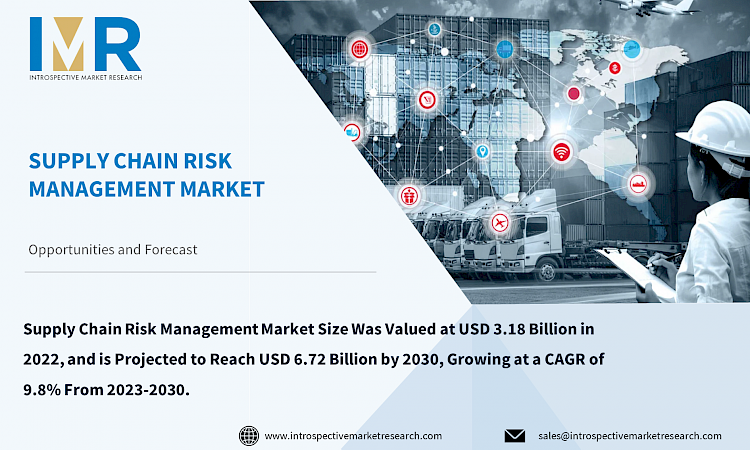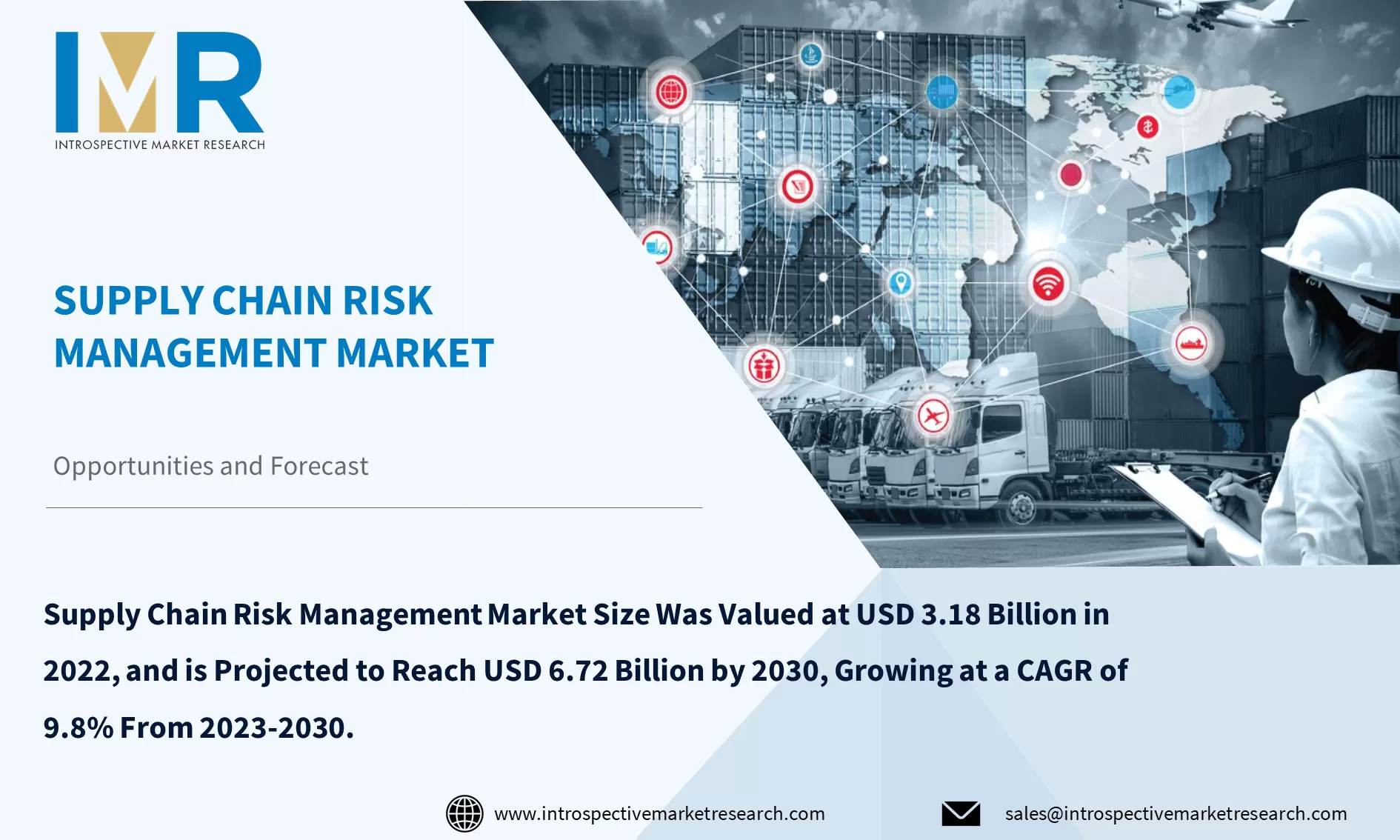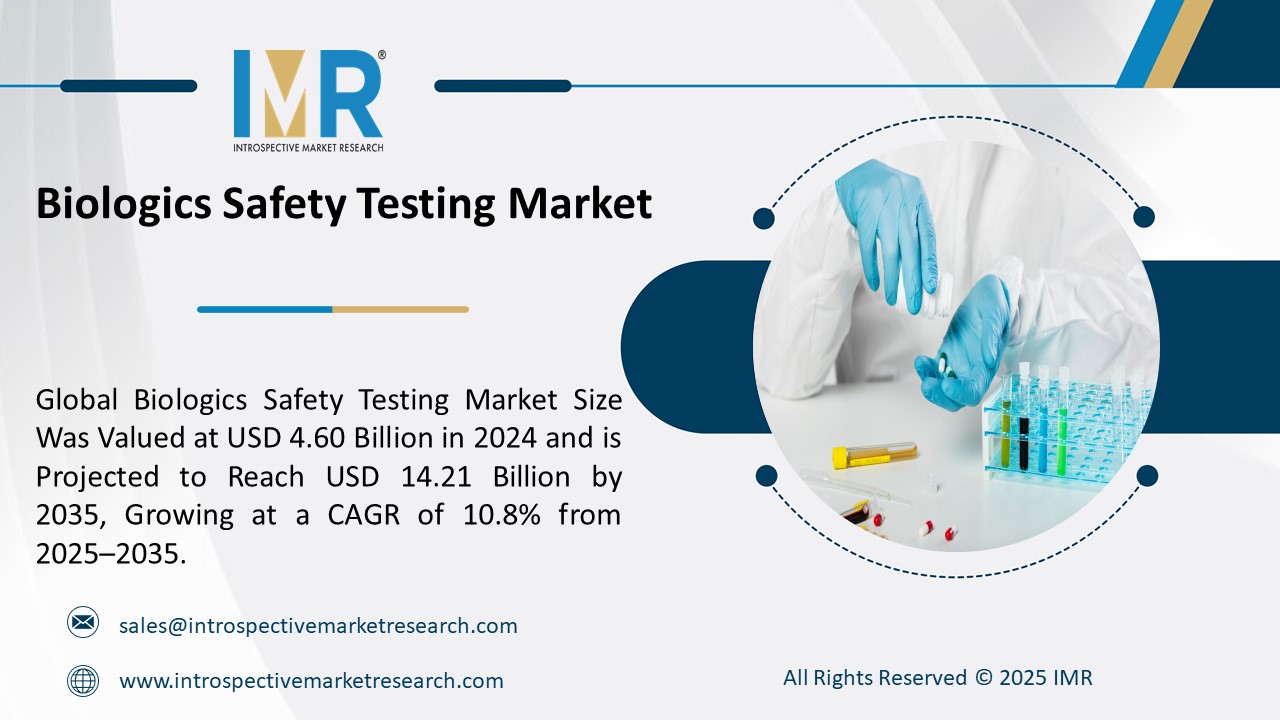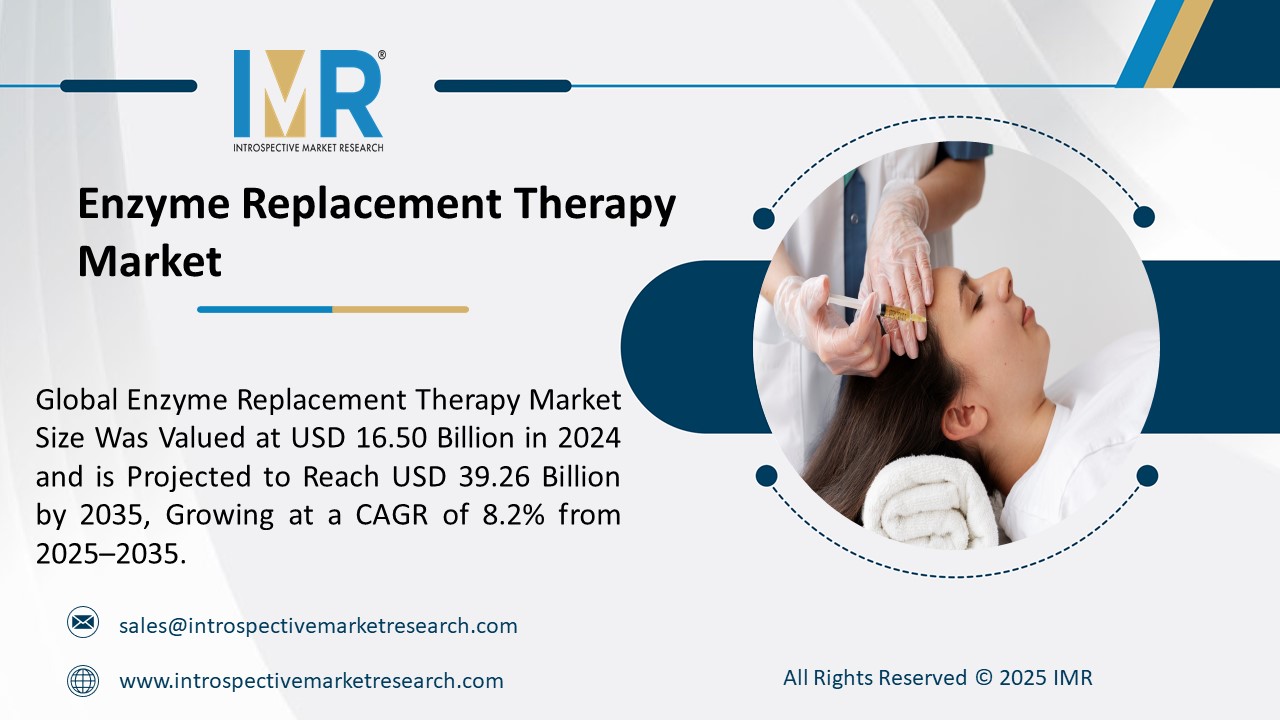
Market Overview:
Supply Chain Risk Management Market Size Was Valued at USD 3.18 Billion in 2022, and is Projected to Reach USD 6.72 Billion by 2030, Growing at a CAGR of 9.8% From 2023-2030.
The goal of supply chain risk management (SCRM) is to ensure the continuity of supply chain operations and reduce the likelihood of disruptions such as product recalls, production delays, quality issues, and supply chain disruptions. The emphasis is on keeping goods and services flowing and protecting against supply chain-related losses. SCRM requires the participation of all supply chain stakeholders, including suppliers, manufacturers, distributors, and customers. It requires a comprehensive and proactive approach that includes risk assessments, contingency planning, risk mitigation strategies, and continuous monitoring & evaluation. Effective SCRM can improve supply chain resilience, boost brand reputation, and reduce the risk of financial loss. it was assumed that only large businesses needed a well-thought-out, comprehensive SCRM plan. This was due to the high cost of implementing a viable SCRM plan. Identifying what to analyse, handling the complexity of data gathering, and gaining organizational buy-in, all required a significant investment of time, effort, and money. Nevertheless, as the world & organizations become more integrated, and supply chains & regulations get more complex, SCRM is an operation that should be addressed by every firm. Organizations can now use AI and Machine Learning (ML)-enabled software solutions to help minimize the cost of building and deploying an SCRM plan. The use of technology has become increasingly important in SCRM, with the use of data analytics, artificial intelligence, & cloud-based systems to manage and monitor supply chain risk. Moreover, SCRM market growth is propelled by increased government regulations and standards. As Governments and industry groups are developing regulations and standards to improve supply chain transparency, accountability, and risk management.
Top Key Players Covered in The Supply Chain Risk Management Market:
- Avetta, LLC
- CURA
- SAP Arbia
- JAGGAER
- DHL International GmbH
- AnyLogistix
- LogicManager, Inc.
- MetricStream
- Marsh LLC
- EXIGER, and Other Major Players
Market Dynamics and Factors:
The global supply chain risk management market is characterized by dynamic shifts influenced by various factors. Heightened geopolitical tensions, trade disputes, and regulatory changes have significantly impacted supply chain operations worldwide. Additionally, the ongoing COVID-19 pandemic has highlighted vulnerabilities in global supply chains, prompting organizations to reassess their risk management strategies. This has led to increased adoption of supply chain risk management solutions that offer real-time visibility, predictive analytics, and scenario planning capabilities to mitigate disruptions and enhance resilience.
Moreover, the advent of advanced technologies such as artificial intelligence, blockchain, and IoT is revolutionizing supply chain risk management practices. These technologies enable proactive risk identification, supply chain mapping, and continuous monitoring of supplier performance and compliance. Furthermore, the growing emphasis on sustainability and corporate social responsibility has compelled organizations to integrate environmental, social, and governance (ESG) criteria into their risk management frameworks.
The Supply Chain Risk Management Market Report Highlight:
- By Component, solutions encompass a wide range of tools and technologies designed to identify, assess, and mitigate risks across the entire supply chain network. Key solution offerings include risk assessment and monitoring platforms, predictive analytics, supplier relationship management systems, and crisis management software. Organizations prioritize investing in such solutions to enhance visibility, streamline communication, and proactively manage risks associated with geopolitical instability, natural disasters, supplier disruptions, and regulatory compliance issues.
- By Deployment, Cloud deployment dominates the global supply chain risk management market due to its inherent advantages in scalability, flexibility, and cost-effectiveness. Organizations across various industries are increasingly adopting cloud-based solutions to manage supply chain risks efficiently. Cloud deployment offers rapid implementation, seamless integration with existing systems, and accessibility from anywhere, enabling real-time collaboration and decision-making. Moreover, cloud-based platforms provide advanced analytics capabilities, allowing organizations to leverage big data and AI-driven insights to proactively identify, assess, and mitigate risks throughout their supply chains.
- By Region, North America emerges as the largest market for Supply Chain Risk Management (SCRM) solutions due to several factors. Firstly, the region's supply chains are characterized by significant complexity, with extensive networks spanning multiple industries and geographies. This complexity amplifies the need for robust risk management solutions to navigate various challenges effectively.
Key Industry Development:
In October 2023, Avetta, a leading provider of supply chain risk management solutions, announced its recent partnership with Ecovadis, a prominent sustainability intelligence platform. This strategic collaboration aims to elevate Avetta's supplier risk management offerings by integrating Ecovadis' extensive sustainability data, enabling a more comprehensive understanding of supplier risk profiles.
In September 2023, CURA, a trailblazer in risk management solutions, announces the launch of its groundbreaking platform, "CURA Connect," designed to transform the way businesses mitigate risks and optimize operations. CURA Connect offers a revolutionary approach to risk management by providing businesses with direct access to a curated network of third-party service providers, streamlining risk mitigation processes and enhancing operational efficiency.
The Supply Chain Risk Management Market Segmentation:
By Component
- Solution
- Services
By Enterprise Size
- Large Enterprise
- Small and Medium Enterprise
By Deployment
- On-Premise
- Cloud
By End Use Industry
- Retail and Consumer Goods
- Healthcare and Pharmaceuticals
- Manufacturing
- Food and Beverages
- Transportation and Logistics
- Automotive
For this report, Introspective Market Research has segmented the Supply Chain Risk Management Market based on region:
Regional Outlook (Revenue in USD Million; Volume in Units, 2023-2030)
North America
o The U.S.
o Canada
o Mexico
Eastern Europe
o Russia
o Bulgaria
o The Czech Republic
o Hungary
o Poland
o Romania
o Rest of Eastern Europe
Western Europe
o Germany
o UK
o France
o Netherlands
o Italy
o Spain
o Rest of Western Europe
Asia Pacific
o China
o India
o Japan
o Singapore
o Australia
o New-Zealand
o Rest of APAC
Middle East & Africa
o Turkey
o Saudi Arabia
o Qatar
o UAE
o Israel
o South Africa
South America
o Brazil
o Argentina
o Rest of SA





